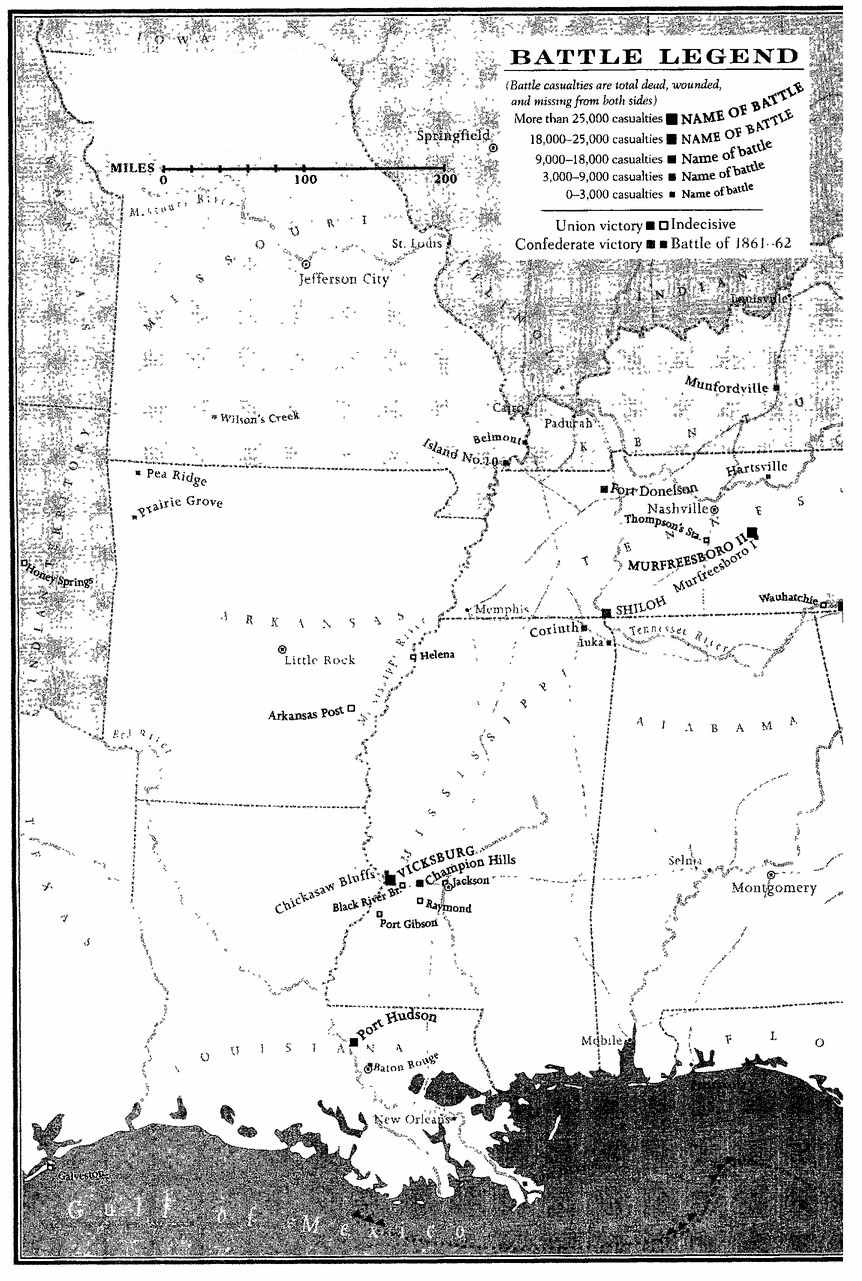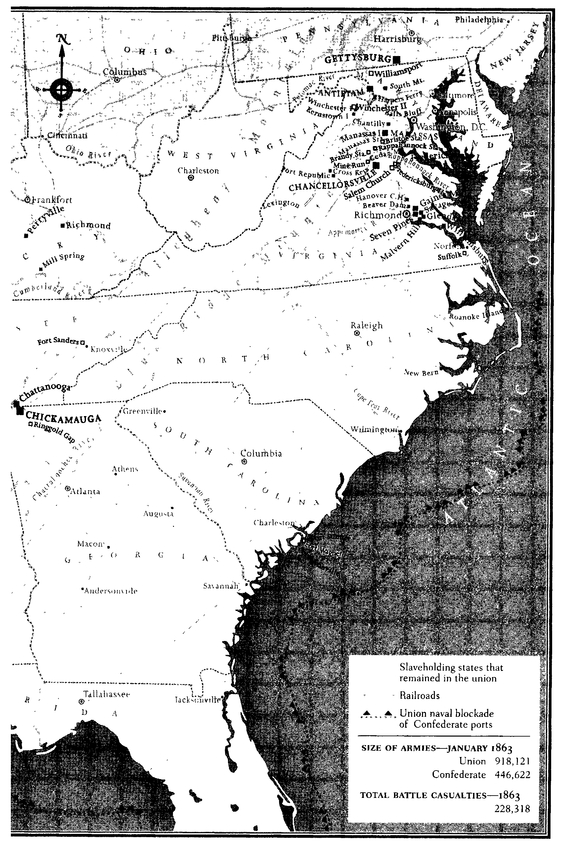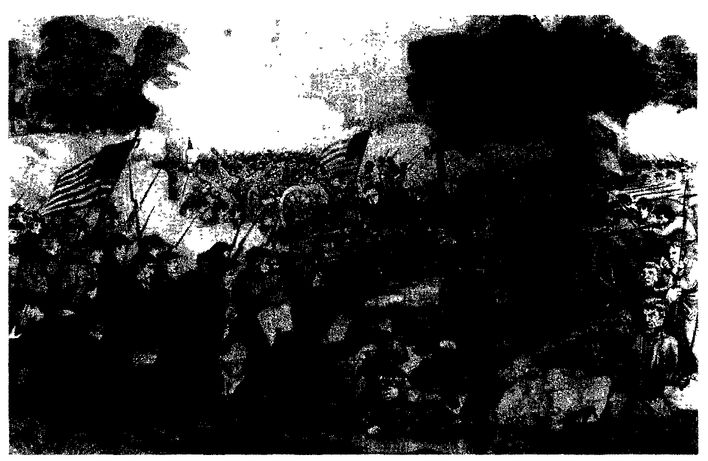Upon the Altar of the Nation (47 page)
Read Upon the Altar of the Nation Online
Authors: Harry S. Stout

1863



The Battle of Gettysburg.
Heroic prints like this one by Currier & Ives helped preserve the place of Gettysburg in American memory as the Civil War’s greatest battle.
Heroic prints like this one by Currier & Ives helped preserve the place of Gettysburg in American memory as the Civil War’s greatest battle.
As heroic as Faulkner’s account is, it only described the Southern memory of Gettysburg. Something besides its romanticization emerged from Gettysburg that would become forever etched in the American imagination. A sacralization of this particular battlefield would mark it forever after as the preeminent sacred ground of the Civil War—and American wars thereafter. Such lasting reverence had less to do with the battle itself than with what happened there four months later on November 19, when President Lincoln returned to the battlefield to participate in the dedication of the national cemetery.
Edward Everett delivered the main oration in standard Ciceronian eloquence and duration (two hours). Lincoln added a three-minute address of his own. It met with scant immediate enthusiasm and was actually belittled by his political detractors. Clergymen, put off that no ministers were asked to speak at the dedication, little realized that America’s greatest sermon had just been preached by a politician rather than a preacher.
Lincoln’s comments would become immortalized as the Gettysburg Address, yet most religious presses failed even to note the occasion. The speech was not issued by a minister, and thus unworthy of note. In one writer’s view: “The whole affair had well nigh been a failure from the absence of many of those large-hearted, conscientious, religious men, from whom this war receives its moral dignity.” Everett was a “true patriot ... but there is in the production little of that breadth of vision which will give it power in the future.” As for Lincoln, his address was summarized in one paragraph and “had none of the manner of an Orator,” despite the fact that “his unselfish and generous devotion to the country had given to him the hearts of the people.”
2
2
One exception was the
Presbyter,
issued out of Cincinnati, which included the text of Lincoln’s address, followed by an account of its reception by an adoring audience: “The president’s address was received with long and loud demonstrations of applause, all assenting that it was the right thing in the right place and a perfect thing in every respect.”
3
Presbyter,
issued out of Cincinnati, which included the text of Lincoln’s address, followed by an account of its reception by an adoring audience: “The president’s address was received with long and loud demonstrations of applause, all assenting that it was the right thing in the right place and a perfect thing in every respect.”
3
In England, where the press often showed itself hostile to the North and to Lincoln, garbled and distorted reports of the Battle of Gettysburg implied a Southern victory. As for Lincoln’s address, it was met with either silence or derision. The London
Times
provided a contemptuous account:
Times
provided a contemptuous account:
The inauguration of the cemetery at Gettysburg was an imposing ceremony only rendered somewhat flat by the nature of Mr. Everett’s lecture, and ludicrous by some of the luckless sallies of that poor President Lincoln, who seems determined to play in this great American Union the part of the famous Governor of the Isle of Barataris.
4
4
What American memory has since elevated to the status of national scripture evoked hardly a ripple in the national consciousness of 1863. Ironically, in an earlier issue, the
Banner of the Covenant
identified the difficulty in perceiving historical legacies in immediate events:
Banner of the Covenant
identified the difficulty in perceiving historical legacies in immediate events:
As the newspaper records events as they
occur,
all the interest of the reader is likely to be concentrated upon the events themselves, whilst their meaning and connections are liable to pass unregarded.... The newspaper, again gives its facts without selection, whilst well composed history is distinguished as much by the character of the matter it embraces, as by the elegance and truthfulness of the narrative ... it is by studying the records of the past, that we learn to read, with the highest intelligence and profit, the transactions of the present.
5
occur,
all the interest of the reader is likely to be concentrated upon the events themselves, whilst their meaning and connections are liable to pass unregarded.... The newspaper, again gives its facts without selection, whilst well composed history is distinguished as much by the character of the matter it embraces, as by the elegance and truthfulness of the narrative ... it is by studying the records of the past, that we learn to read, with the highest intelligence and profit, the transactions of the present.
5
Even Lincoln was unaware of the legacy his words would imbue to later generations, both at the time he delivered the address (“The world will little note nor long remember what we say here”) and in its immediate aftermath. In a letter to Edward Everett, written the following day, Lincoln praised Everett for his speech, in particular, “the tribute to our noble women for their angelministering to the suffering soldiers.” In response to Everett’s earlier praise (“I should be glad if I could flatter myself that I came as near to the central idea of the occasion in two hours as you did in two minutes”) Lincoln replied, “I am pleased to know that, in your judgment, the little I did say was not entirely a failure.”
6
6
Never in American oratory has there been a greater understatement than this. Lincoln’s rhetoric would connect forever after with Americans seeking a common meaning for their collective experience, and that meaning was, the literary critic Edmund Wilson later recognized, “quite mystical.”
7
A Christlike tolerance appeared in his meditations as he reflected on the war’s innermost meaning—not the “Union” triumphing over an evil Confederacy, but a common sacrifice that, in God’s time, would deliver a united redeemer nation. In his address, Lincoln refused to condemn his enemies, as Everett had done so ruthlessly moments before. But neither had he yet reached the all-embracing “charity for all” that would come only with victory in sight.
7
A Christlike tolerance appeared in his meditations as he reflected on the war’s innermost meaning—not the “Union” triumphing over an evil Confederacy, but a common sacrifice that, in God’s time, would deliver a united redeemer nation. In his address, Lincoln refused to condemn his enemies, as Everett had done so ruthlessly moments before. But neither had he yet reached the all-embracing “charity for all” that would come only with victory in sight.
Scholars have rightly praised the literary qualities of Lincoln’s brief address at Gettysburg as a new sound in American rhetoric.
8
But in American memory, it became much more. It became the sacred scripture of the Civil War’s innermost spiritual meaning. Central to that meaning was the revolutionary principle, always in need of implementation, that “all men are created equal.” By linking past (“four score and seven years ago”), present (“these honored dead”), and future (“a new birth of freedom”), Lincoln presented a redemptive republic wedded to an idea (“that all men are created equal”) in timeless form. As long as the idea survived, so too could America be assured that this “government of the people, by the people, for the people, shall not perish from the earth.”
8
But in American memory, it became much more. It became the sacred scripture of the Civil War’s innermost spiritual meaning. Central to that meaning was the revolutionary principle, always in need of implementation, that “all men are created equal.” By linking past (“four score and seven years ago”), present (“these honored dead”), and future (“a new birth of freedom”), Lincoln presented a redemptive republic wedded to an idea (“that all men are created equal”) in timeless form. As long as the idea survived, so too could America be assured that this “government of the people, by the people, for the people, shall not perish from the earth.”
If the white Northern press exhibited a muted response to the dedication speech, the African Methodist Episcopal
Christian Recorder
proved more enthusiastic. The November 28 issue carried a complete description of the setting, a verbatim transcript of the address “amid a scene of wild and lengthened excitement,” and the prayer of dedication by the House chaplain “delivered in the most impressive manner, and ... listened to with breathless attention.” Two weeks earlier, the
Recorder
perceived in Gettysburg and Vicksburg the death knell of slavery and a “new life”: “with the removal of slavery ... we may reasonably anticipate the decline of sectional jealousies, until in the future we shall know no North, no South—we shall all be Americans.”
9
Tragically, while right on a common white America, they could not perceive that many African Americans would be left out of the new nation.
Christian Recorder
proved more enthusiastic. The November 28 issue carried a complete description of the setting, a verbatim transcript of the address “amid a scene of wild and lengthened excitement,” and the prayer of dedication by the House chaplain “delivered in the most impressive manner, and ... listened to with breathless attention.” Two weeks earlier, the
Recorder
perceived in Gettysburg and Vicksburg the death knell of slavery and a “new life”: “with the removal of slavery ... we may reasonably anticipate the decline of sectional jealousies, until in the future we shall know no North, no South—we shall all be Americans.”
9
Tragically, while right on a common white America, they could not perceive that many African Americans would be left out of the new nation.
While the South fasted for its autumn defeats, President Lincoln issued a national thanksgiving proclamation on October 3, 1863, for the last Thursday of November. He thus set in motion the ritual machinery that would become America’s national Thanksgiving Day, a time to reflect on the sacred destiny of America. In his proclamation, Lincoln recited the blessings of international peace and victory: “They are the gracious gifts of the Most High God, who, while dealing with us in anger for our sins, hath nevertheless remembered mercy ... and fervently implore the interposition of the Almighty Hand to heal the wounds of the nation and to restore it as soon as may be consistent with the Divine purposes to the full enjoyment of peace, harmony, tranquility, and Union.”
10
10
The use of “Union” is significant here, but equally significant is the fact that it appears in the context of “healing” and not retribution, and “Divine purposes” rather than divine right. Conspicuous by their absence are references to “freedom” and emancipation, ideals more apt to divide Northern audiences and congregations than to unite them.
Upon receiving news of the national thanksgiving, a writer for the New York Evangelist traced the long history of thanksgiving days in New England and then went on to contrast them to Lincoln’s proposed national day of thanksgiving, which “of course ... will supercede the State Thanksgivings.” The writer was confident that “the people of New England and of the older states, will be pleased to see their ancient custom thus honored, [and] will cheerfully accept the day designated by the President, and will gladly merge their usual celebrations in this more general observance.”
11
Even as the national government was creating a Union that would supercede particular states, so too was the nation’s sacred identity increasingly defined and “merged” in national rather than sectional or state holy days.
11
Even as the national government was creating a Union that would supercede particular states, so too was the nation’s sacred identity increasingly defined and “merged” in national rather than sectional or state holy days.
The November thanksgiving prompted widespread pulpit commentary on America’s mission not only to its own or their regions but to the world. In a thanksgiving address to his Baptist congregation, Henry Clay Fish looked out upon two thousand hearers and described the “Grand Issues of the War” from God’s vantage point. Emancipation clearly held a central position: “Freedom for the
enslaved
blacks on our own soil is
one
of the things involved, and a very important one.” But most important was the promise of global freedom that would only be possible if the Union persevered: “For if we fail here, and above us darkness gathers, what star of hope remains in the whole horizon? I said rightly, then, that in this struggle we stand for the world, we represent the world.
For the world freedom lives or dies here and now!”
12
enslaved
blacks on our own soil is
one
of the things involved, and a very important one.” But most important was the promise of global freedom that would only be possible if the Union persevered: “For if we fail here, and above us darkness gathers, what star of hope remains in the whole horizon? I said rightly, then, that in this struggle we stand for the world, we represent the world.
For the world freedom lives or dies here and now!”
12
In Chester County, Pennsylvania, near where the Battle of Gettysburg had raged, the Reverend John M‘Leod preached at a “Union Meeting” to local Baptist and Presbyterian churches. M’Leod began by recalling the recent dedication of the Cemetery of Gettysburg, which “will be a memorial to coming ages that there were patriots in 1863, who felt they belonged to a country worth dying for.”
13
13
With all of the bloodshed in the past year, one principle remained unmistakably clear to M‘Leod: “We are a Nation.... The rebellion makes it clear to ourselves and to all foreign powers that we are a nation.” Throughout his address M’Leod ridiculed those European skeptics who believed democracy could not survive a massive convulsion such as civil war. Luckily for them, M’Leod continued, they were mistaken, because American success was for their good as well as for the good of the Union. Europeans needed America more than America needed Europe. In fact, the world needed America. Emancipation was important, and a black soldier “makes a good soldier,” but ultimately, the Civil War fulfilled “the mission of America.” That mission, in brief, was messianic: “God in his providence, we believe, is preparing this nation for a high service of Christian influence through the world.”
14
14
The common lesson to be taken from the Gettysburg Address and Lincoln’s Thanksgiving Day proclamation was the expanding scope of freedom. The same writer for the
Banner of the Covenant
who witnessed the Gettysburg Address came back to that theme in quoting a thanksgiving sermon whose central argument was that “[o]n Cemetery Hill, now consecrated forever to the memory of valor and sacrifice, were conquered more fears, prejudices, political obstinancies, and schemes of treason, than ever fell before in one single conflict. A dead revolution lies in that immortal field.”
15
Banner of the Covenant
who witnessed the Gettysburg Address came back to that theme in quoting a thanksgiving sermon whose central argument was that “[o]n Cemetery Hill, now consecrated forever to the memory of valor and sacrifice, were conquered more fears, prejudices, political obstinancies, and schemes of treason, than ever fell before in one single conflict. A dead revolution lies in that immortal field.”
15
Other books
Las sirenas de Titán by Kurt Vonnegut
Imperfect Chemistry by Mary Frame
#3 Turn Up for Real by Stephanie Perry Moore
A Cookie Before Dying by Lowell, Virginia
Tangled Souls by Oliver, Jana
Darkest Mercy by Melissa Marr
The Mortal Immortal by Mary Wollstonecraft Shelley
One Through the Heart by Kirk Russell
Oxford Handbook of Midwifery by Janet Medforth, Sue Battersby, Maggie Evans, Beverley Marsh, Angela Walker